
Police Review Commission presents: Community Policing Now (2002)
Police Review Commission presents: Community Policing Now Panel participants included Background: In 2002, the PRC held a series of neighborhood meetings to gain perspective from members of the community regarding policing tactics and service. The meetings culminated with a well-attended forum on Community Policing in December, featuring nationally known experts as panelists. All labor donated - Viewed on cable access in Berkeley. Berkeley <ALSO READ> Police aim to step up community efforts |
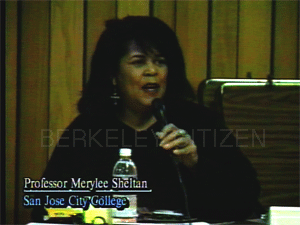 |
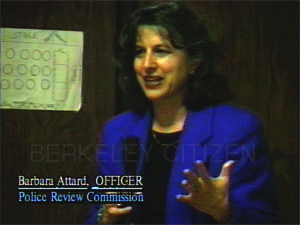 |
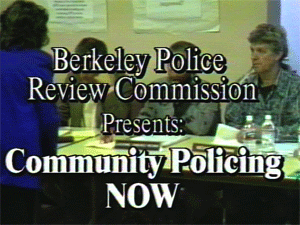 |
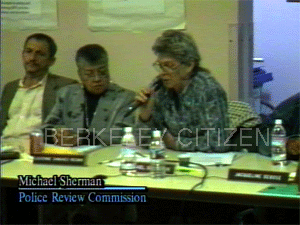 |
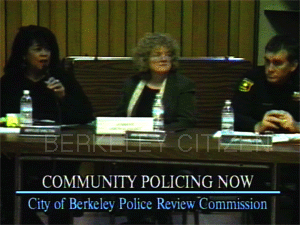 |
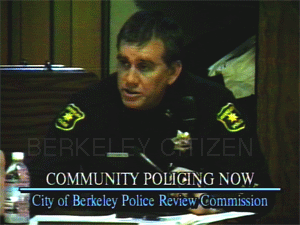 |
Police aim to step up community efforts
By Devona Walker, Daily Planet Staff, June 26, 2002
Chief Butler retires in July; Meisner to fill in as chief
The Berkeley Police Department freely admits that July will be a rough and tumble road loaded with challenges. Next month the department will deal with an unusually high number of retiring officers, including the departure of Chief Daschle Butler, and the subsequent training and recruitment of replacement personnel.
In addition, the department will revamp its internal communication and computer systems. And last, but not least, the department is facing an increase in violent crime nearly equal to that of the mid- to late-1980s, when crack first hit the streets. In the interim, while Berkeley conducts a national search for Butler’s replacement, Deputy Chief Roy Meisner will run the department.
Meisner says he’s approaching the challenge with three distinct priorities in mind. “It’s about community engagement — people I call the VIP’s, the very important people in all this and they are the people who live here, the residents, the merchants and the people who shop here in Berkeley,” Meisner said.
Meisner said that one way in which the police department can improve community policing is to open lines of communication with neighborhood groups to better address safety concerns. Quality of service is the second priority for the police department.
“And problem-solving is the third Priority,” Meisner said, adding that solving the problems that face Berkeley will have to involve a lot more than simple enforcement. “Those are really the three things we try to emphasize and it’s really a philosophy,” Meisner said.
Outgoing Chief Butler echoed Meisner’s priorities and stated that police department must have a role in addressing the cause of crime and not just the outcome. “There’s an ebb and flow to drug trafficking and the violence that’s associated with it,” Butler said. “And now we’re on that cycle where we are having more of it, and we are responding to it.”
Butler worked in narcotics for several years before becoming police chief. He believes that a holistic approach to the current increase in violent crime will be imperative.
“We are constantly struggling and fighting that. The big challenge for many municipalities will be looking at abatement at education, and the idea that the community needs to self actualize as a whole,” Butler said. “It’s not fair just to look at the enforcement issue. We have to look at cause, and we can’t just get into warehousing people.”
In particular, Butler addressed the need for vocational opportunities for Berkeley’s youth. Even though the city provides a plethora of services, there are still not enough of them. He also pointed to a recent drug operation in south and west Berkeley that yielded the arrest of 42 people on possession and trafficking charges.
Butler said that the police department will continue to work with those communities to decrease violence as well as offer viable alternatives to the “drug life.” “We need to totally revive the community policing effort,” Butler said. “Somehow or the other, we got a little side-tracked there. But we’ve got to get back to that.”
Butler added that only about10 percent of the department’s work involves law enforcement. “The larger part of what we do involves quality of life issues,” he said. Much like Butler, Meisner was born in San Francisco and has lived in the Bay Area his whole life. Also much like Butler, Meisner does not call Berkeley his home.
“I couldn’t afford the mortgages around here,” Meisner said, adding that many of the department’s personnel do not live in Berkeley, which complicates the department’s future staffing needs. “We offer competitive salaries, but sometime officers don’t want to commute for several hours, so the housing issue makes retaining officers more difficult,” Meisner said.
“Not only is Chief Butler leaving but so are a number of other experienced officers and that’s experience that we really are going to miss,” he said. “There’s a lot of training associated with that and shepherding,” he added.
And as the department faces the challenge of returning to community policing, it must consider the loss of retiring staff members and their long-standing relationships in the community. Furthermore, the newer, younger officers must indoctrinate themselves into their jobs and into “Berkeley’s own unique community.” “And the communities themselves have changed as well,” he added.
He also said that the City Council has asked the department to address increased traffic and accidents as soon as possible.
“Crime, traffic and staffing will be the biggest obstacles for me to address,” Meisner said. “And one of challenges of taking over is looking at what we are doing now and what we can do in the future, how we can improve upon that and I want to work with the community to make these things happen.” Specifically, Meisner and Butler both said the community can look forward to seeing more beat officers in their neighborhoods and an increased emphasis on communication. Department staff that works as community liaisons will attend more neighborhood and community meetings.
“Generally, I’m very proud of our employees, and I think we do a great job. But nobody’s perfect, and we are not pretending to be,” Meisner said, adding that the community and police department can educate each other.
“And even though that housing is an issue as it relates to getting to know the community, it really gets down to the individual officers and how open they are to the community. And it’s not just about the officers, but also the jail staff, the communication staff, clerical people and parking enforcement, all of these elements make up the department,” Meisner said.
“And everyone wants really the same thing,” he continued. “They want to live in a safe community. They want their kids to be safe when they go to school. Berkeley has a lot of great things to offer, and I never wanting lose sight of that.”
Meisner became deputy chief in 1993. His tenure as interim chief starts July 13.
All Rights Reserved